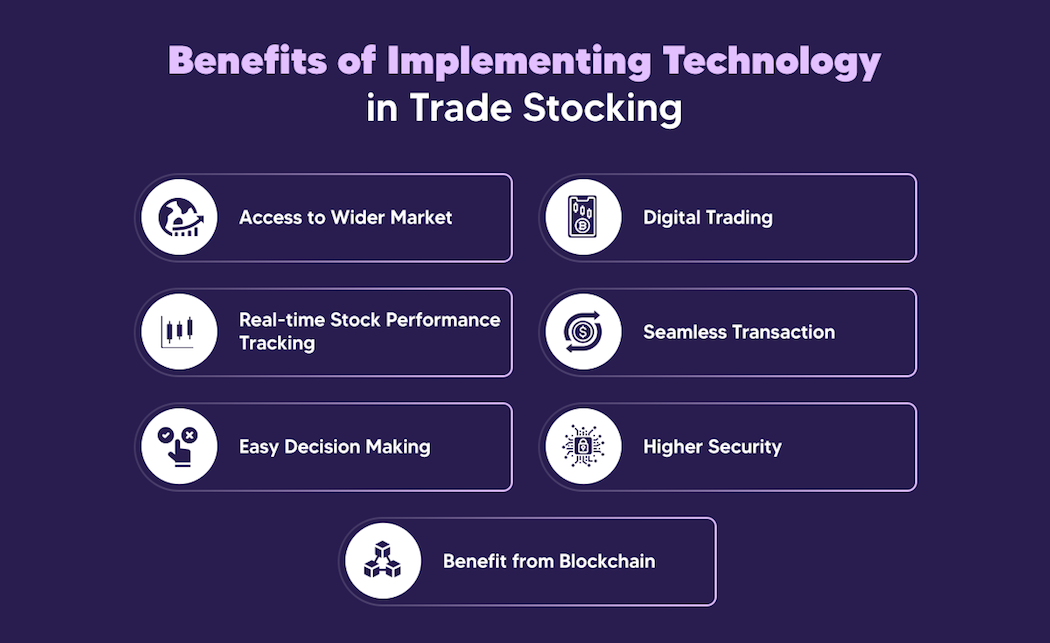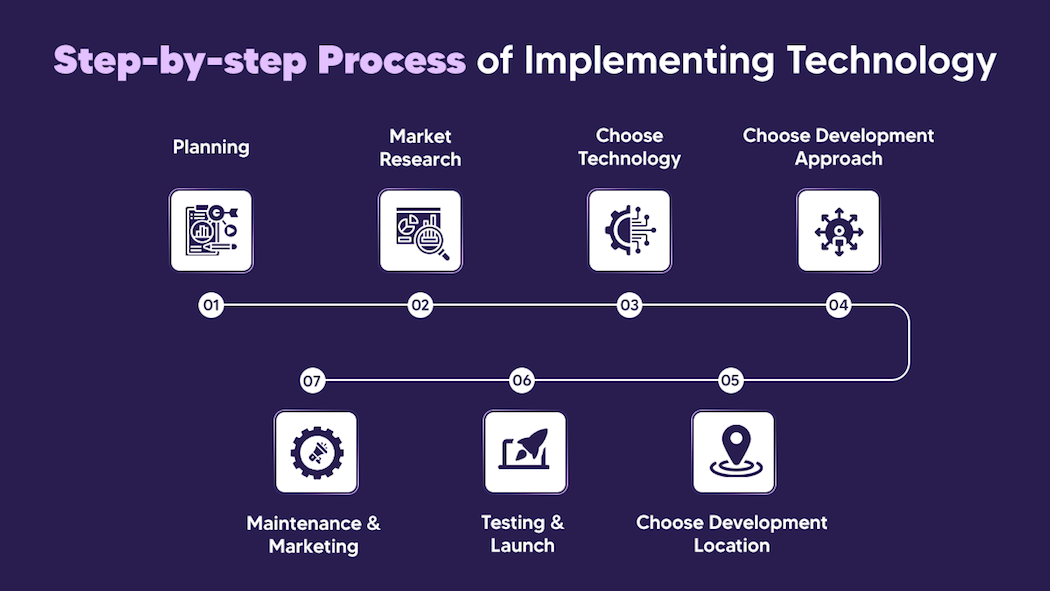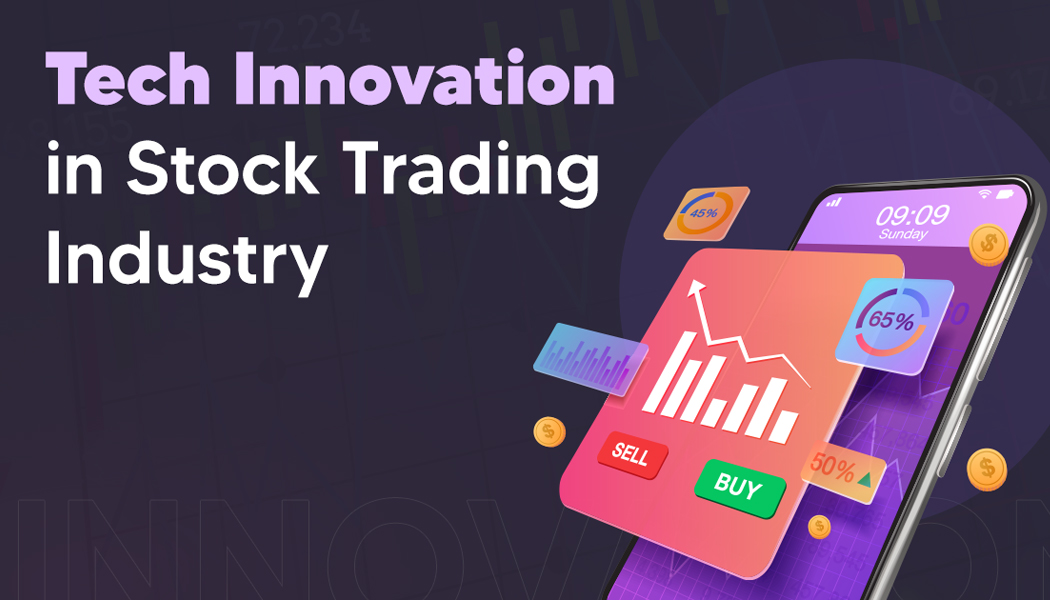Business Idea: Implementing Technology in Stock Market for Better Trading + Implementation Process
Technology has tremendously transformed the world we are living in. Owing to the latest tech advancements, numerous economies, businesses, and industries have gained immense success and have changed for good.
The latest technology enables businesses to do almost everything and anything digitally. This benefit of technology is what compels businesses to transform their operations and go digital.
One of the most prominent implementations of tech-based innovations is evidently seen in the stock trading sector. This industry has implemented technology and has massively shifted to online mediums in recent years.
Tech-innovation and Stock Trading Industry
The businesses in the stock trading sector are massively adopting technology-based solutions and are going digital to improve the efficiency of the trading process.
Trading stocks physically and manually is an obsolete process and is long abandoned by most of the stock traders. In the present time, the brokers as well as stock traders are using technology to their benefit and are increasing the manageability and security of the stock trading process.
Moreover, the current generation is known to be heavily reliant on technology for everyday tasks. People nowadays are tech-friendly and prefer to do things digitally. Owing to this factor, it is only wise for stock trading businesses to go digital in order to retain their customers.
You may ask, 'what are the benefits of implementing technology in a trade stocking business?' The following section will cover various benefits of tech implementation in the stock market industry.
7 Benefits of Implementing Technology in Stock Trading

Access to Wider Market
As we discussed before, investment in technology is promising owing to its widespread adoption. Currently, people from all generations and age groups are using technology in one form or the other and are benefitting from it.
As a result, businesses that invest in digital technology can surely gain access to a wider consumer market to sell their goods and services. The stock trading market is no exception in this matter and has witnessed a tremendous hike in its market reach by investing in technology.
As a result, stock trading businesses that undergo digitalization have access to a wider market and can sell their services to a larger audience. Naturally, these businesses earn higher revenue than those that don't.
Digital Trading
Once your business has access to a large audience, you can sell them your goods/ services and earn revenue. This concept is also applicable in the stock trading industry, where technology is useful for higher revenue growth.
The latest tech advancements enable stock traders to trade stocks digitally and earn money. This aspect of digital technology is highly popular in the stock trading industry.
Moreover, digital trading has been proven to increase the trading frequency of stocks. This means that the stocks are now being purchased and sold in a short time span. This concept is also known as day trading and is popular amongst people trading in stocks.
Real-time Stock Performance Tracking
One of the most important parts of stock trading is monitoring the performance of stocks from time to time. It is commonly known that the stock values are always fluctuating and, therefore, need constant and close tracking.
Digital technology facilitates this need and enables people investing in the stock trading sector to track the performance of the stocks in real-time.
Now, stock traders can check the value of their stock at any time of the day and trade it on the spot to get the best returns. Moreover, certain technologies like AI also enable traders to anticipate the stock's value in the near future for better trading decisions.
Seamless Transaction
One of the most prominent implementations of technology is in digitalizing transactions and automating finance processes. This, in turn, results in seamless and error-free financial transactions.
Using technology-based solutions in the stock trading sector, businesses can trade stocks seamlessly. These technologies facilitate online transactions and banking in which funds are transferred in a short time span.
Moreover, technologies like cryptography and blockchain have further made transactions secure and ensure that the traders receive their share from trading without any hurdles. This aids the share trading process and makes it more secure and reliable.
Easy Decision Making
As we mentioned earlier, technology solutions like AI have drastically improved the stock trading market by enabling users to predict the future value of stocks. This has facilitated easy decision-making among the traders and has enabled them to maximize their profits.
Moreover, digital technology connects different stock traders with each other and forms an online community. The traders can use this community to provide tips and get the latest news on the stock trading market.
This further eases the job of decision-making and ensures that the traders are investing their money in the right stock at the right time. This, in turn, uplifts the stock trading industry and is, therefore, a noteworthy benefit of tech implementation in the stock trading sector.
Higher Security
Owing to the large number of people investing in trading stocks, the market for stock trading is at great risk of fraudulent activities. However, a stock trading business can overcome this challenge by implementing technology-based solutions.
Digital technology solutions are known to be highly secure and transparent and make a reliable platform to trade stocks. Using digital solutions, you can ensure to have a rigid record of each and every transaction and, therefore, gain market trust.
Moreover, this technology is also useful for ensuring that consumer data is safe and secure and is not being used for any kind of malpractice. This further adds to the market trust and makes digital stock trading a pleasant experience.
Benefit from Blockchain
Businesses all across the globe are adopting blockchain technology. This technology is known for its highly reliable nature and for providing added security to a business's processes.
This technology has tremendous potential in the stock trading market and is a reliable medium to trade stocks digitally. Blockchain technology decentralizes and securely stores data in individual blocks, therefore maintaining its integrity.
Blockchain has numerous benefits in the stock trading industry, such as process automation, high-end platform security, seamless trade settlement, effortless transaction recording and tracking, and more. This makes blockchain a worthy investment for businesses operating in the stock trading industry.
Now that you know why to implement tech-based solutions in the stock trading sector, you must be wondering what all technologies are suitable for stock trading businesses. Here are the top 3 digital technologies for businesses in the stock trading industry.
Top Technologies for Stock Trading Industry

Mobile Applications
Mobile applications are undoubtedly one of the most popularly used and common technologies at present. Speaking factually, there are over 5.34 billion mobile phone users all across the globe.
This makes investment in mobile app development a great business idea for stock trading businesses. You should know that numerous stock trading apps already exist in the market. However, not every application is successful in the market.
You must conduct thorough market research to know what exactly the market needs and develop an application or any other technology based on these needs. We have described the complete platform development process in the later section of the blog so make sure to read until the end.
Nevertheless, there are two ways to develop a mobile application, which are native development and cross-platform development.
Native Applications
Native development is an approach to building an app in which different applications are developed for different operating systems. Generally speaking, Android and iOS are two of the most prominent OS platforms, and most of the native applications are developed to cater to these OS markets.
Some of the most popular technologies for developing native android applications are Java and Android Studio. On the other hand, Swift and Objective-C are popular for native iOS app development.
Native applications are fast-performing, offer a high-end user experience, and, therefore, have tremendous popularity. However, the development cost and time required for developing native applications are high.
Cross-platform Applications
Cross-platform applications are based on the concept of 'one code runs everywhere'. These applications are coded once and have the capability to run on multiple operating systems, which is the reason why they are popular amongst startups and businesses with a low budget for app development.
Some of the most popular technologies for developing cross-platform applications are Flutter, React Native, and Xamarin. These technologies result in high-end cross-platform applications and are the leading market choice.
However, it is important to know that cross-platform applications lag in performance and, therefore, deliver a compromised user experience. Moreover, these applications require various third-party API integration to access OS-level hardware, which further decreases app speed.
Each of these approaches will have its own impact on the app development time, cost, and final app quality. Moreover, whether to go for the native or cross-platform approach is a choice that depends upon your individual business requirements.
Nevertheless, if you are a business operating in the stock trading industry, you can largely benefit from mobile applications. These apps enable digital stock trading, online payments, transaction security, and many other benefits.
Artificial Intelligence & Big Data
AI (Artificial Intelligence) is one of the top trending technologies in the stock trading market. This technology is based on machine learning and is known to provide highly precise and accurate results.
By implementing artificial intelligence technology in your business's operations, you can significantly automate your stock trading business's efficiency.
This artificial intelligence technology is based on big data, which enables machine learning by feeding on large quantities of data. This, in turn, is useful for predicting the stock's future value. Based on these predictions, the traders can trade their stocks and generate maximum returns.
This makes artificial intelligence a promising technology in the stock trading industry.
Blockchain
Blockchain is a relatively new technology but has gained tremendous popularity in recent times. The technology revolves around decentralizing data and storing it online. This is achieved by breaking data into smaller bits and storing it at different locations.
The concept of blockchain technology is known for increasing data security and making it resistant to infiltration. When implemented in the stock trading industry, blockchain technology has numerous implementations.
One of the most popular implementations of blockchain technology in digital stock trading is to increase the security of financial transactions. Moreover, stock trading businesses can hold a solid record of each and every transaction and increase their transparency, therefore gaining market trust.
Bitcoin, which is one of the most popular trading assets and a well-known cryptocurrency, is based on blockchain technology. This makes investing in blockchain a worthy investment for businesses in the stock trading industry.
These were the top 3 technologies that are commonly used in the stock trading industry. By analyzing each of these technologies, you can find out the best match for your business and implement it into your business.
However, how does one implement technology in their stock trading business? The following section will cover the step-by-step technology implementation process for stock trading businesses.
7-step Technology Implementation Process

Planning
Planning is the primary stage of implementing technology and ensures optimum and seamless tech implementation. Here, a business has to outline its growth objectives and analyze the company's potential to go digital.
By planning your business's tech implementation thoroughly, you can ensure that you have the right pathway to lead your business and gain maximum benefits.
Numerous businesses underestimate the importance of this step and end-up failing. However, let us tell you that thorough planning is highly crucial for a business's long-term success. Therefore, we recommend you carefully plan the technology implementation for your stock trading business.
Market Research
Once you have planned exactly what you want to do for your business's digital transformation, it is time that you implement this plan. This is where the role of market research comes into the scenario.
By conducting thorough market research, you can ensure that your plan is at par with the market's requirements and is fulfilling the customer's needs. This will enable you to gain assurity on your digitalization plan and will guarantee maximum success.
Generally speaking, market research includes analyzing the target market, industry, and competitors. By analyzing these three elements of the market, a business can find out what exactly the market is looking for and create a solution that fulfills this need.
Moreover, market research is also useful for businesses to find the market gap. By working on filling this market gap, a business can gain a competitive advantage and add USP to its digital product.
The findings from the market research are highly useful for shaping the technology that one aims to develop for their stock trading business. For example, if you are looking to develop a mobile app for your stock trading business, market analysis will give you an idea of features to add to your application.
Once you have thoroughly researched the market, you are all set to start the technology development process for your stock trading business.
Choose Technology
This is the stage where you have to determine the type of technology you wish to develop for your business. Earlier, we had mentioned that mobile applications, artificial intelligence, and blockchain are three of the most prominent technologies for stock trading businesses.
However, there are numerous other technologies for businesses to choose from. You must choose a technology based upon your business's and market's requirements. Once you have determined the technology you wish to implement in your business, you can go ahead and execute its development.
Choose Development Approach
There are numerous ways to develop digital technology for your stock trading business. You need to understand the concept of different approaches and weigh down their pros and cons to find out the most optimum one.
Each of these approaches has its own impact on the platform development cost and time and on the platform's quality. Therefore, it is essential for a business to choose an approach carefully while undertaking digital platform development.
Want to know about these approaches in detail? Here is a detailed explanation of 3 development approaches.
Self Development
Self-development, also known as DIY development, is an approach in which the business owner undertakes the complete development cycle all by themself. To elaborate, the business owner takes the role of project manager, UI/UX designer, development, QA tester, and business analyst and develops the complete platform by themself.
A business can save a significant sum of money by developing a platform by itself. However, this approach is not very practical. When a single person plans to undertake the complete development cycle, the platform will naturally take more time to develop.
Moreover, it is commonly known that a single person cannot have expertise in every field. As a result, by developing a complete platform by yourself, you will be compromising on the end quality of your platform. This makes self-develop a less favored option by business owners and is highly discouraged.
Hiring a Team
It is always good to have a complete team of experts working on your project. The concept of hiring a full-time team is based on this approach and is highly favored by large-scale businesses.
By hiring a full-time team, you can most certainly get your platform in a short time span. Moreover, since there is a specialist working on each part of the development process, your platform will be of high quality.
However, the cost of hiring a complete development team can be impractical in certain cases. Moreover, a business will have to spend additionally on managing human resources, further adding to the development cost. This makes hiring a full-time team a cost-intensive option, making it practical only for large-scale businesses.
Development Outsourcing
Development outsourcing is by far the most popular option and is an excellent development approach for businesses of all scales. In this approach, the business outsources its platform development requirements to either an agency or a freelancer/ team of freelancers.
You must know that the outcomes of outsourcing to an agency and freelancer are poles apart. While agencies have a complete team to work on, it is not the case with freelance developers. Moreover, outsourcing agencies offer guaranteed outputs and high-end results and are known for their years of expertise.
Freelance developers, on the other hand, are known to abandon projects as per their convenience. Moreover, there is no guarantee of the quality of output with freelance developers. Consequently, outsourcing to an agency is the most prominent option at the present time.
These were the three development approaches for stock trading businesses to choose from. As we mentioned earlier, you need to weigh down the pros and cons of each approach based on your individual requirements and business objectives to make the best choice.
Choose Development Location
It is commonly known that development rates vary from one location to another. Therefore, choosing the right development location is the best way to optimize the cost of your platform development project.
This is a crucial choice when you outsource your platform development project. However, if you go for self-development or hiring an in-house team, you can safely skip this step.
Generally speaking, Asian countries like India are known to be the best locations for outsourcing platform development. With development rates as low as $15/hour, India is the globally leading choice for businesses looking for low platform development costs and high-quality output.
Testing & Launch
Once your platform has been developed, you are almost ready to launch it in the market. It is commonly known that the best of developers can create platforms with bugs and errors. These bugs are a result of negligence in the development process.
This is where the role of testing comes into the scenario. Testing enables business owners and developers to realize the bugs in the platform and helps them to eliminate them before the platform's launch.
By optimally testing your platform, you can ensure that your platform is free from bugs and errors before it is made available to the target users.
Maintenance & Marketing
Once you have launched your platform, you need to undertake regular maintenance measures to ensure its optimum quality. Maintenance ensures that the platform is up to date with the market's requirements and is performing well.
Moreover, by periodically maintaining and updating a platform, business owners can add the latest features to attract and retain users. Another important post-launch activity is marketing.
Marketing is the process of attracting the relevant target audience to your platform and increasing its reach. By undertaking efficient marketing practices, you can generate optimum ROI and gain profit.
This was it for the process of developing a digital platform for your stock-trading business. By carefully following these steps, you can create a successful platform and gain maximum returns on your investment.
Summing It Up
The stock trading industry is going through tremendous digital transformation and is benefitting from digital technology. This is changing the paradigm of the industry and the way how traders trade stocks.
The benefits of implementing technology in the stock trading industry are immense. By understanding these benefits and carefully analyzing them, a business can generate maximum returns.
All you need to do is follow the latest business trends, choose the right technology and follow the complete development process, and your stock trading business is all ready to go digital.




